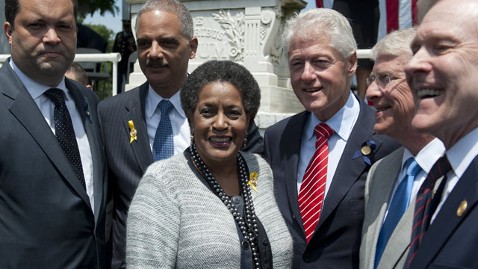Medgar Evers' Widow Myrlie 'Can't Let Dream Die' 50 Years Later

(Image Credit: Saul Loeb/AFP/Getty Images)
ABC News' Alisha Davis @msalishadavis reports:
It has been 50 years since civil rights leader Medgar Evers was gunned down in the driveway outside his home in Jackson, Miss., and his widow, Myrlie Evers-Williams, says she still feels him speaking to her.
At a memorial honoring him in Washington Wednesday, Evers-Williams remembered her husband's saying, "I love my wife and I love my children. And I will give my life and give it gladly so that they can have a better life in this country of mine."
A white supremacist did, indeed, take his life June 12, 1963. But 50 years later, dignitaries, including former President Bill Clinton and Attorney General Eric Holder, gathered near Evers' grave-site in Arlington National Cemetery to pay tribute to the slain hero.
Watch Robin Roberts interview Myrlie Evers-Williams Wednesday on "Good Morning America."
Back in 1963, Medgar Evers was a World War II veteran who had put his life on the line for his country but, like so many black soldiers, found that upon returning home, black people were barred from voting in many Southern states. Dedicated to fighting racial injustice, he became the first field organizer for the NAACP in Mississippi, working to register black voters and desegregate public institutions.
It was a job Evers-Williams, 80, says they both knew would eventually cost him his life. "We knew what was going to happen," she tells ABC News. "Our last night together we talked about the increased anger and violence and he said, 'I don't know how long.'"
Evers-Williams and her three children were home watching television the very next day when "the children heard their dad's car and he pulled into the driveway. And then they heard the loud blast."
Medgar had been shot in the back and left bleeding to death in his front yard with his wife holding his body and his children watching in horror: "I remember so well them saying, 'Daddy get up, Daddy get up.'"
The assassination began what proved to be a pivotal moment in the civil rights movement. Within months, four little black girls were murdered in an Alabama church bombing, Martin Luther King Jr. led the March on Washington and President John F. Kennedy was also slain.
Since then, Evers-Williams has fought to keep alive the memory and the meaning of Medgar Evers' life. Her battle to bring her husband's killer to justice was turned into the 1996 film "Ghosts of Mississippi," with Whoopi Goldberg playing her on the big screen.
Now, five decades after the slaying, she says she is no longer haunted by those ghosts. At the DC memorial for her husband, who died at age 37, she spoke of visiting one of the exhibits on display around the country to mark this 50 th anniversary and seeing the rifle used to kill her husband.
"I stopped still in my spot … and I looked at it and the anguish that I felt that rose from my feet to the top of my head is something that I cannot explain," she told the crowd gathered at Arlington. "But as I stood there and I continued to look at it, I saw another vision of that rifle. … I saw the flash of the fire from that bullet being fired … But [this time] that fire represented freedom for each and every one of us."
Reflecting to ABC News on the changes in U.S. society, she says, "Maybe it happens with 50 year anniversaries."
While serving as the commencement speaker at the University of Mississippi a few weeks ago, a once whites-only school that rejected Medgar Evers because of his skin color when he applied in 1954, Evers-Williams says she expected to encounter some hostility.
Instead, she says, "I was extremely well received. I was prepared for almost anything with the audience. I went in in fight mode. But there was an apology for the way Ole Miss treated Medgar at the time. I was not expecting an apology."
Myrlie-Evers Delivers Inaugural Prayer
She says she has been pleasantly surprised by so much this year, including her invitation to give the opening prayer at President Obama's second inauguration in January, the first woman and the first layperson to do so.
"I am still overwhelmed by that," she says, laughing. "If you look at the original program for the March on Washington, I was on it, but I couldn't get through the crowd and therefore I was unable to speak. And it hurt for all this time until I received the invitation from Obama to speak."
Evers-Williams, who went on to raise her three children, make two unsuccessful bids for Congress and eventually serve as the chair of the NAACP, is still active in the struggle for civil rights despite turning 80 in March. She heads up the Medgar & Myrlie Institute, which seeks to educate the activists of tomorrow, and says she hopes that the celebrations surrounding the 50 th anniversary of Evers' death will help put the spotlight on all the work that still needs to be done as people around the world still struggle against injustice.
"People want to be treated in a humane way regardless of what country you're referring to," Evers-Williams says. "And we can't let that dream die. We have to do more than commemorate fifty years and the March on Washington. It has to be more than that. Sometimes I feel like going to a mountaintop myself and screaming, 'We aren't through yet.' However much time I have left, that's what I want to do with it."
Watch Robin Roberts interview Myrlie Evers-Williams Wednesday on "Good Morning America."